Today, we talk to Sian Murray, one of the co-founders of Pleasant State, a cleaning product brand that was conceived with a focus on sustainability, from water-soluble cleaning bars to refillable packaging. Together with her co-founder Ami Bateman, Sian launched the business through a successful crowdfunding campaign and has kept its growth trajectory despite the pandemic in full swing during its launch. True to its advocacy, Pleasant State has been giving back to like-minded causes such as Take 3 for the Sea, an education-based non-profit that is trying to eradicate plastic from the oceans.
ISB: What inspired you to come up with water-soluble cleaning bars?
SM: In late 2019, Ami had been struggling with debilitating headaches for two years. She’d been trying to eradicate single-use plastics and nasty chemicals from her home to address the issue but couldn’t find a solution for her cleaning products. A friend had told her about just-add-water cleaning products in Europe and the US so she started looking into it. She soon realised that no one was manufacturing or even selling products of this kind D2C in Australia or New Zealand so she thought, “Why don’t I do it!? It seems like a no brainer”.
ISB: What makes the products safer for the environment compared to other cleaning solutions?
SM: Your everyday cleaning sprays are made up of 97 per cent water. We’ve just taken the three per cent active ingredients and formulated a highly effective, plant-based concentrated cleaning bar that you can dissolve in water. Our solution doesn’t just remove the need for pointless single-use plastic packaging, it stops us from transporting litres of water contributing to unnecessary greenhouse gas emissions and puts an end to toxic cleaning chemicals entering our waterways. Our products are biodegradable, greywater and septic safe, even our bars wrappers are home compostable. To date, we’ve been able to save over 50,000 plastic cleaning bottles from going to landfills.
ISB: How were you able to successfully launch your venture through crowdfunding?
SM: We’ve bootstrapped Pleasant State to date but needed additional funds to cover the initial order of our glass and silicone bottles so we went with a crowdfunding campaign. It also acted as a bit of a tester to get us into the market early while also testing messaging and market fit. The campaign launched on IndieGoGo in August of 2020 and we raised $87,315! We drove hype through socials, Facebook ads and PR. My strong recommendation would be to ensure you have a healthy database prior to launch. It was really hard work, neither of us had been involved in a crowdfunding campaign before. But in the end we smashed the target and it left us with this incredibly engaged and supportive community.
ISB: The business was launched as COVID was on the horizon, how were you able to weather the challenges laid by the pandemic?
SM: Things had been trucking along nicely, but once COVID hit we had to make a decision. Pull back while we try to understand this new reality, or push on and take the opportunity to completely commit ourselves to the business. Clearly we chose the latter of the two, a decision we’re very happy with in retrospect. We did have to work really hard to stay on top of supply chain issues. Product delivery delays, lack of ingredients etc were all challenging, but because we manufacture the majority of our products close to home it made it a bit easier to manage.
ISB: How do you envisage Pleasant State developing in the next couple of years?
SM: We’ve got some really big things coming up at Pleasant State. We recently launched our subscription offering and referrals reimagined campaign and we have a couple of new products coming very soon! The next few years are all about growth for us, we’re really keen to take our proven strategies and start scaling them so we can scale our impact and grow our team. We’re currently preparing for a raise in the middle of this year so we can fund this growth.
ISB: What is the most important lesson that you feel that other would-be entrepreneurs should take to heart?
SM: Know your strengths and acknowledge your weaknesses! As an entrepreneur, there’s this pressure to be good at everything and it can be overwhelming. Over the last few years, I’ve often been frustrated with myself, thinking things like, “I should have known that.” But the reality is, you’ve never done this before. As the business grows you’ll be able to focus more on your strengths. But in the meantime, give it your best shot and don’t be too hard on yourself when it doesn’t work out. You’ve got this!













